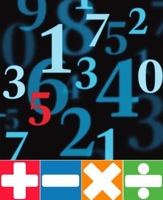Arithmetic
Origin
Middle English arsmetrik, from Anglo-French arismatike, from Latin arithmetica, from Greek arithmētikē, from feminine of arithmētikos arithmetical, from arithmein to count, from arithmos number; akin to Old English rīm number, and perhaps to Greek arariskein to fit
Definitions
- 1a : a branch of mathematics that deals usually with the nonnegative real numbers including sometimes the transfinite cardinals and with the application of the operations of addition, subtraction, multiplication, and division to them
- b : a treatise on arithmetic
2: computation, calculation
Description
Arithmetic or arithmetics (from the Greek word ἀριθμός = number) is the oldest and most elementary branch of mathematics, used by almost everyone, for tasks ranging from simple day-to-day counting to advanced science and business calculations. It involves the study of quantity, especially as the result of combining numbers. In common usage, it refers to the simpler properties when using the traditional operations of addition, subtraction, multiplication and division with smaller values of numbers. Professional mathematicians sometimes use the term (higher) arithmetic when referring to more advanced results related to number theory, but this should not be confused with elementary arithmetic.[1]
